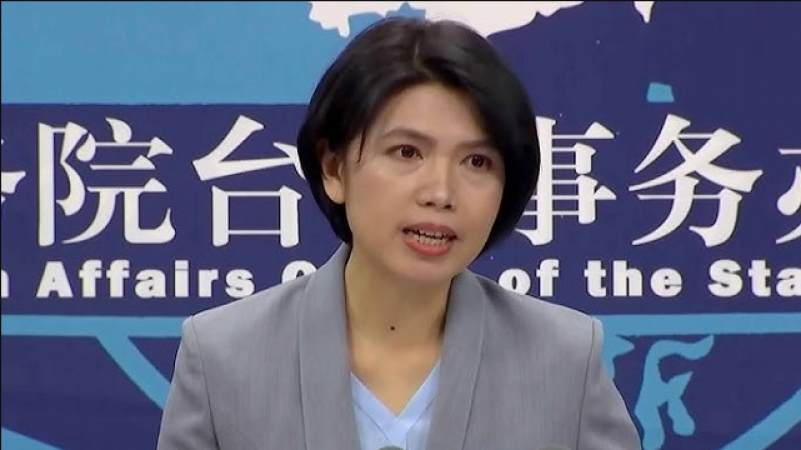
BEIJING: Officials in charge of Beijing's Taiwan policies said on Wednesday that the mainland would continue to prioritize peaceful reunification with the island, while intensifying punishment for Taiwan's pro-independence forces.
According to officials, tough measures are needed to prevent Taiwan's Democratic Progressive Party and the United States from weakening the one-China principle. He said that these measures would not harm the interests of other countries.
Zhu Fenglian, a spokesman for the State Council's Taiwan Affairs Office, said, "We will continue to introduce new legal measures based on the developments and changes of the situation in order to resist and oppose separatist efforts and acts of "Taiwan independence". To safeguard national sovereignty, security and development interests."
Zhu's remarks came after tensions in the Taiwan Strait, especially after US House Speaker Nancy Pelosi visited the island in August. Beijing retaliated by imposing sanctions on Pelosi, her close relatives, as well as seven Taiwanese politicians and government officials.
Approved Taiwanese officials and their families are prohibited from entering Hong Kong, Macau, or mainland China, and organizations to which they belong are prohibited from cooperating with those on the mainland.
The anti-secession law, which forbade Taiwan's independence and stated that the mainland side would take "non-peaceful" action if all options for peaceful integration were explored, was passed by the National People's Congress in Beijing in 2005.
Beijing will create new rules to punish Taiwan's independence forces, according to Zhang Wensheng, deputy dean of Xiamen University's Graduate Institute for Taiwan Studies.
These regulations may include changes to the anti-segregation law that specify specific penalties and new criminal law provisions that establish the legal basis for such sanctions.
There have been calls for years to amend the anti-secession law, which some have criticized as being overly vague, particularly the section regarding the use of "non-peaceful" means. However, Zhang stressed that it was unlikely Beijing would outline the circumstances in which the force would be employed.
Ahead of the Communist Party Congress, which will take place next month and is expected to see a major leadership reshuffle and important policy discussions, Zhu and other senior mainland officials in charge of Taiwan affairs are completing ten years of cross-strait development duties. Huh. ,
After a civil war on the mainland, China and Taiwan split in 1949, when the Kuomintang was defeated by Communist Party forces and fled to Taipei. Beijing does not rule out using force to capture the island as it sees it as part of its territory. Most nations do not recognize Taiwan as an independent state, including the US. However, Washington opposes any attempt to capture the island using force.
The People's Liberation Army has been conducting exercises across the island since Pelosi's visit, with its fighter jets and drones crossing the midline, which serves as the de facto border between Taiwan and the mainland.
However, Zhu and other mainland officials claimed that Beijing's actions did not target the majority of Taiwanese citizens, but only outside forces and the pro-independence movement. He claimed that the mainland action would be "accurate" in hitting his intended targets.
Ma Xiaoguang, another spokesman for the Office of Taiwan Affairs, reaffirmed the commitment made in an official letter on Taiwan policy that the office issued last month: "We will strive for the possibility of peaceful reunification with the greatest sincerity and best efforts." are ready."
"It should be emphasized that the integration of China will not harm the legitimate interests of any country, including its economic interests in Taiwan, but will enhance the development opportunities for all countries," the statement continued.
According to Ma, the "one country, two systems" governing principle—adopted for Hong Kong and Macau—could be used to resolve the Taiwan issue.
He added that Taiwan is capable of implementing a social structure different from that of the mainland.
"The social order and lifestyle of Taiwanese compatriots will be fully respected, and the personal property, religious beliefs and legitimate rights and interests of Taiwanese compatriots will be fully guaranteed," the statement said.
Ma said several initiatives, including trade in agricultural commodities, have been taken since 2018 to encourage economic cooperation with the island.
Since 2016, when Tsai Ing-wen of the Democratic Progressive Party took office as the island's president, official communication between Taiwan and the People's Republic of China has been halted.
The meeting, according to Qiu Kaiming, director of the research division at the party's Taiwan Work Office, demonstrated Beijing's "strategic flexibility" towards Taiwan.
He continued, "The meeting demonstrated to the world that Chinese people on both sides of the strait are intelligent and competent enough to address our own issues.
USC is being sued by the family of a Chinese student who died while being filmed
US and Canadian warships transit the Taiwan Strait For the second time this year
China remains a formidable challenge: Navy chief